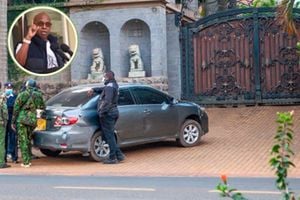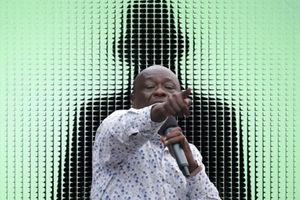
President William Ruto and his deputy Kithure Kindiki with National Intelligence Service Director General Noordin Haji (left) and his three predecessors, Maj Gen (Rtd) Philip Kameru, Maj Gen (Rtd) Michael Gichangi and Brig Gen (Rtd) Wilson Boinett at State House Nairobi on November 5, 2024. President Ruto granted a charter to the National Intelligence University marking a critical milestone for the 25-year old NIS, the force of Kenya's modern espionage that was created as Kenya retired the colonial era Special Branch.
Dwight Eisenhower, the 34th President of the United States, said “the price of liberty is eternal vigilance”. That is the price of justice, the price of community, and the price of security. It was a summary of the need for national intelligence services.
If the Israeli Mossad infiltrate their enemies to the extent of procuring and supplying them with explosive pagers and causing them great harm; when the CIA or the former Soviet KGB risk their lives destabilising and gathering intelligence from their enemies, it is always a pre-emptive action giving them prior knowledge which is a great power.
For intelligence officers, it is a silent duty, a hushed-up existence, a soundless toil. They die and are buried quietly, noiselessly and even their close families never realise what real jobs they do. The James Bonds of this world are the fictional characters that try to give us a fictional Hollywoodised version of these lives.
They forego the habit of trust in humans; they operate in the underworld and at the same time at the surface. They live shrouded and nosey for the state; they snoop even on relations who have harmful motive. They may be called upon to infiltrate into dangerous groups and live their precarious and dangerous lives just to unearth information for the state.
In short, they must try as much as possible to be unhuman.
For a long while, they were considered vermin in Kenyan society. They were mainly concerned with the political issues and were the backbone of the oppressive one-party dictatorship in the country. That role changed and professionalism took over. A terrorist attack takes place and lives are lost; Kenyans want to know what the government was doing about it. Why didn’t they stop it before it happened? Who did it and why? How are they to be brought to justice and when?
Best-kept secrets
They are the men who know Kenya's deepest and best-kept secrets. They are the guardians who keep watch while the nation sleeps. On November 5, in an unprecedented gathering at State House, Nairobi, four generations of Kenya’s most secretive and powerful intelligence chiefs stood together – a rare moment when the shadows briefly lifted to reveal the faces that have shaped the nation's security landscape for the last quarter-of-a-century. They are the four men who have weathered Kenya’s most turbulent storms, their combined service representing two-and-a-half decades of the nation's most closely-guarded secrets.
Each man has faced his own baptism by fire. Each has carried the weight of national security during moments when Kenya teetered on the brink. Their rare public appearance – current spy chief Noordin Haji, flanked by his predecessors Maj-Gen (Rtd) Philip Kameru, Maj-Gen (Rtd) Michael Gichangi, and the pioneering Brig (Rtd) Wilson Boinett – offered a fleeting glimpse into the usually invisible world of Kenya's intelligence service representing 25 years of Kenya's modern intelligence history. Their presence marked a pivotal moment, a silver anniversary of sorts: The chartering of Kenya's National Intelligence University, an institution that will forge the next generation of the country's national security keepers.
Breaking the military ceiling
In the corridors of power, Haji's presence is particularly significant. As the first career intelligence officer to ascend to the helm of the National Intelligence Service (NIS), his rise marks a seismic shift in an institution traditionally led by military generals.
“This is the coming of age of Kenya’s intelligence service,” remarks a senior security analyst. Haji’s journey through the ranks of NIS, handling everything from counterterrorism to transnational crime, represents a new chapter in Kenya’s intelligence narrative. His predecessors – all distinguished military commanders – had built the foundation. Now, one of their own protégés leads the service.

President William Ruto (centre) Maj-Gen (Rt) Michael Gichangi, (top left) Brig (Rt) Wilson Boinett (bottom left), Maj Gen Philip Wachira Kameru (top right) and Noordin Haji.
Haji’s ascension is not just a personal achievement; it symbolises a broader transformation within the NIS. For decades, the agency relied heavily on military expertise to navigate complex security challenges. The transition to a leader from within the intelligence community reflects a growing recognition of the need for specialised skills in an era where threats are increasingly sophisticated and multifaceted.
The Generals who built an empire
The story of Kenya’s modern intelligence service is inextricably linked to the military precision of its founding fathers. Brig (Rtd) Boinett, the architect of the transition from the feared Special Branch to the professional NIS, brought military discipline to civilian intelligence. Under his watch, the service underwent a transformation that would rival any military operation in its precision and scope.
“We needed the military's organisational strength,” offers a retired intelligence officer who served under Boinett. “The transition from a tool of political oppression to a professional intelligence service required the kind of discipline only military leadership could provide.” Boinett's tenure began in 1999, a time when Kenya was emerging from decades of political repression. The Special Branch, a remnant of colonial rule, had been synonymous with oppression and surveillance. Boinett’s mission was clear: To dismantle the old guard and build a new intelligence service that would serve the nation, not the political elite.

President William Ruto and his deputy Kithure Kindiki with National Intelligence Service Director General Noordin Haji (left) and his three predecessors, Maj Gen (Rtd) Philip Kameru, Maj Gen (Rtd) Michael Gichangi and Brig Gen (Rtd) Wilson Boinett at State House Nairobi on November 5, 2024. President Ruto granted a charter to the National Intelligence University marking a critical milestone for the 25-year old NIS, the force of Kenya's modern espionage that was created as Kenya retired the colonial era Special Branch.
Under Boinett, the NIS underwent a comprehensive overhaul, recruiting university graduates and establishing a training academy with international instructors. This period also saw the creation of an “analysis and production division” to enhance the agency’s capabilities. Boinett’s leadership laid the groundwork for a service that would evolve into a sophisticated institution capable of addressing the complex security challenges of the 21st century.
Guardians through crisis
Each leader faced their crucible. Gichangi steered the service through the blood-soaked post-election violence of 2007-2008, when Kenya teetered on the brink of civil war. The violence erupted after the disputed re-election of President Mwai Kibaki, leading to widespread ethnic clashes that left over 1,000 dead and hundreds of thousands displaced. Gichangi's military and intelligence expertise was pivotal in navigating this internal crisis, as ethnic tensions erupted following the disputed re-election of Kibaki. The crisis was eventually resolved through a power-sharing agreement with opposition leader Raila Odinga.
Gichangi’s tenure was marked by efforts to stabilise the nation and address the underlying ethnic and political tensions. His leadership during this tumultuous period demonstrated the critical role of intelligence in maintaining national security and social cohesion.
Maj-Gen (Rtd) Kameru, appointed by President Uhuru Kenyatta in 2014, brought his expertise from military intelligence to the NIS. His tenure was characterised by significant security challenges, including a series of deadly attacks by the Somali militant group al-Shabaab. Notable incidents included the 2014 bus hijacking and quarry attack, as well as the 2015 Garissa University massacre, which left nearly 150 students dead.
Kameru’s leadership saw the NIS advising on the creation of the elite Special Operations Group (SOG), a paramilitary unit trained to operate in high-stakes environments. The SOG, part of the Border Patrol Unit, is renowned for its rigorous training and effectiveness in counter-terrorism operations. According to the Ministry of Interior, only a small fraction of recruits complete the specialised training, underscoring the unit's elite status.
“What that 100 does is equal to what 10,000 would do in ordinary circumstances,” Deputy President Kithure Kindiki once remarked about this elite unit, whose selection process is so rigorous that only 5 per cent of candidates make the cut. The SOG’s creation was a direct response to the escalating threat of terrorism, particularly from al-Shabaab, which has perpetrated attacks within Kenya.
A new dawn
President Ruto, speaking at the ceremony, captured the gravity of the moment. “The National Intelligence Research University represents our commitment to staying ahead of evolving security threats,” he declared. “In an era of hybrid warfare and digital threats, the battleground has shifted from physical territories to the realm of information and technology.”
The university’s charter ceremony, witnessed by these four guardians of Kenya's secrets, marks more than just an academic milestone. It represents the evolution of Kenya's intelligence service from its military roots to a sophisticated, modern institution capable of facing 21st-Century threats.
The establishment of the National Intelligence University is a testament to Kenya's commitment to investing in its security infrastructure and ensuring that its intelligence officers are equipped with the knowledge and skills necessary to navigate an increasingly complex global landscape.
As the university prepares to welcome its first cohort of students, it aims to foster a new generation of intelligence professionals who will be trained in cutting-edge research and innovative practices. The curriculum will focus on intelligence studies, cybersecurity, counter-terrorism, and other critical areas essential for national and regional security.
The unseen guardians
As the four men met at State House, the weight of their collective responsibility was palpable. Between them, they hold secrets that will never be told, victories that will never be celebrated publicly, and sacrifices that will remain forever hidden. Their motto – Apti Parati Fideles (Sure, Ready, Faithful) – echoes through their legacy.
From Boinett's military precision in rebuilding the service, through Gichangi's steady hand during political turmoil, to Kameru's tactical innovations against terrorism, and now to Haji's modern leadership, they represent an unbroken chain of guardianship.
The intelligence officers who operate in the shadows, often at great personal risk, are the unsung heroes of Kenya’s security landscape. Their work is shrouded in secrecy, yet it is vital to the nation's stability and safety.
As Kenya continues to navigate complex security landscapes, the establishment of the National Intelligence University represents a forward-looking approach to national and regional security. By fostering academic excellence and research innovation, the university aims to equip future intelligence officers with the skills needed to address evolving threats.
Mr Wanga is the Political Editor, NMG; [email protected]











